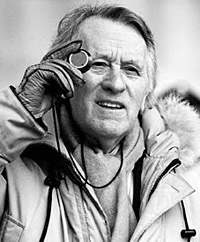
Back فريدي فرانسيس Arabic فريدى فرانسيس ARZ Freddie Francis Catalan Freddie Francis German Freddie Francis Spanish فردی فرانسیس Persian Freddie Francis Finnish Freddie Francis French Ֆրենսիս Ֆրեդի Armenian Freddie Francis Italian
Freddie Francis | |
|---|---|
 Historical photo of Francis | |
| Born | 22 December 1917 Islington, London, England |
| Died | 17 March 2007 (aged 89) Isleworth, London, England |
| Resting place | Mortlake Crematorium, Kew, London, England |
| Occupation(s) | Cinematographer, film director |
| Years active | 1937–1999 |
| Spouses | Gladys Dorrell
(m. 1940; div. 1961)Pamela Mann (m. 1963) |
Frederick William Francis BSC[1] (22 December 1917 – 17 March 2007) was an English cinematographer and film director whose filmmaking career spanned over 60 years, from the late 1930s until the late 2000s.[2] One of the most celebrated British cinematographers of his time,[3] he received numerous accolades for his photography, including two Academy Awards and five BAFTA Awards.[4] As a director he was best known for his horror films, notably those made for production companies Amicus and Hammer in the 1960s and 1970s.[5]
Francis started his film career as a cameraman for John Huston and for the directing team of Powell and Pressburger before becoming a cinematographer for notable British films such as Jack Clayton's drama Room at the Top (1959), Jack Cardiff's Sons and Lovers (1960) – which earned him his first Oscar – and the psychological horror film The Innocents (1961). He became well-known for his rich black-and-white CinemaScope framing, and was regarded as one of the top cameraman in the British film industry.[5] He made his directorial debut with the romantic comedy Two and Two Make Six (1962), but gained the most attention for his horror films and thrillers. During the 1960s he was a house director for Hammer Productions, where he made Paranoiac (1963; an early starring vehicle for Oliver Reed), The Evil of Frankenstein (1964), and Dracula Has Risen from the Grave (1968). In the 1970s he worked mainly for Amicus Productions, for which he notably directed the horror anthology Tales from the Crypt (1972).
After nearly two decades as a director, Francis returned to cinematography with The Elephant Man (1980). This established a collaboration with director David Lynch, for whom he also shot Dune (1984), and The Straight Story (1999). He won his second Oscar for the American Civil War film Glory (1989). He also earned acclaim for his work on Karel Reisz's The French Lieutenant's Woman (1981), and Martin Scorsese's Cape Fear (1991).[6]
In addition to his Oscar and BAFTA wins, Francis received an international achievement award from the American Society of Cinematographers in 1997, a lifetime achievement award from the British Society of Cinematographers the same year, and BAFTA's special achievement award in 2004.
- ^ "BSC Members | British Society of Cinematographers". bscine.com. Retrieved 2 July 2024.
- ^ "Francis, Frederick William [Freddie] (1917–2007), cinematographer and film director". Oxford Dictionary of National Biography (online ed.). Oxford University Press. 2004. doi:10.1093/ref:odnb/98649. Retrieved 31 October 2020. (Subscription or UK public library membership required.)
- ^ "Cinematic Glory: Freddie Francis, BSC". The American Society of Cinematographers. Retrieved 2 July 2024.
- ^ "Freddie Francis | British cinematographer and director". Encyclopedia Britannica. Retrieved 31 October 2020.
- ^ a b "Freddie Francis: 10 essential films". BFI. 22 December 2017. Retrieved 2 July 2024.
- ^ "Freddie Francis: 10 essential films". BFI. Retrieved 29 December 2021.